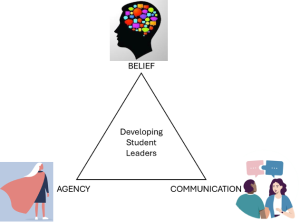
3 Keys to Unlock Student Leadership Development Pt. 1
 Oct 31, 2024
Oct 31, 2024
A Teacher’s Perspective to Student Leadership Development
In this article, an MOE-trained teacher shares her views on developing student leaders during their Secondary School years. She highlights three main aspects by which teachers can enable and empower students to thrive as leaders.
These are (1) agency, (2) belief and (3) communication respectively. Each will be dealt with in detail in the article, do note that in practice, these should overlap and not be exercised individually.
Student Leadership in the Past
Having been a student leader, sports captain and later orientation group leader in my own Secondary School experience, the clear conclusion is that student leadership today will not work in the old model. In order to better appreciate the later suggestions of student leadership development, indulge me as I outline my own experience with teachers two decades ago.
Student leaders of the past were selected mostly at random. My form teacher called my number from the class register, and that was how I become the class monitor. Later in Upper Secondary, my coach had us run laps, I had finished first and as a result was appointed captain of the team.
My personal leadership experiences were mostly coincidental, development was not a concern. This was not due to negligence on the part of the teachers, but more so that in the culture then, the teacher-student relationship was largely prescriptive.
My form teacher would give me a list of tasks during the morning assembly and as class monitor, I would make sure I completed those before she came into class for the day.

As a student, appointed as a leader, it was my responsibility to fulfil the appointment. That is to complete a list of tasks, be it taking attendance, collecting homework and the like. Should I fail several times at a task, my teacher had the prerogative to switch me up with another student.
On top of that, I could be punished for being irresponsible. We were not trained to be class leaders like today, neither was there any need for it as we conducted mainly administrative tasks.
With this as a backdrop, we see then how drastically the role of student leaders have changed over the years. Therefore, as educators, we have to likewise change our methods and mindset towards student leadership development. I would like to propose three areas we can possibly use collectively as a framework to enable and empower students reach their fuller leadership potential.
Student Leadership Reality Check

Agency, belief, and communication can be imagined as three points of a triangle with belief at its peak, agency on the bottom-left and communication on the bottom-right. Having these three areas constantly as the back of your mind as you plan for student development may help your students grow as leaders, but more importantly as future contributing valuable members of the society at large.
Let’s quickly deal with the elephant in the room. Often time as adults, when we attend meetings with the office, what goes unsaid weighs heavier that whatever is actually being presented.
Under our breath we grumble that lunch is not catered despite being a full-day conference, we murmur about our HOD’s brand new branded bag and matching leather shoes, and we begrudge the external vendor for having talked for one-hour without conducting a single activity and so on.
While all these may be commonplace and normal even for most of us, it is not healthy for an organization and even less so for student leaders stepping into their new roles and faced with new expectations.

How does the role of the teacher come in? The teacher now has to put on the student developer hat. In that role, the teacher’s main aim is to support his or her leader’s trajectory. Rather than to present a to-do list like a teacher of old, the student developer considers which task fits which student’s profile? How can I best facilitate their leadership journey? What is my student best at and which areas would I like to see him / her do better in? And so on.
